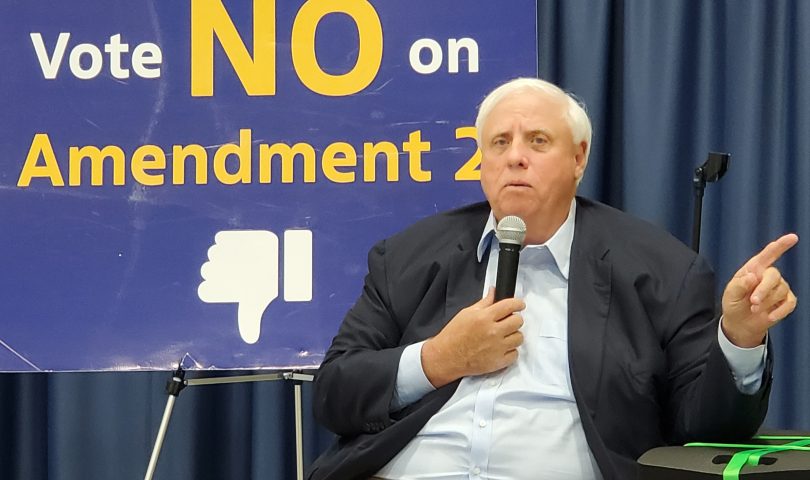MORGANTOWN — Gov. Jim Justice admitted he was feeling the effects of the road Wednesday as he and Babydog rolled into Morgantown for the latest stop of their tour opposing Amendment 2.
As such, it didn’t take him long to get to the point.
“If this happens, you’re toast,” he said to the small crowd of, primarily, local officials and politicians gathered at the Mon County Center on the first day of early voting.
Amendment 2, or Property Tax Modernization Amendment, is one of four constitutional amendments before the voters. If passed with a simple majority, it would give the state legislature the authority to change or eliminate personal property taxes, including car taxes.
He said the ability to eliminate taxes on personal vehicles was tossed in for a reason, calling it a “constitutional amendment couched as a car tax.”
“People went around bragging about it. ‘We put that with it. We’re so smart. They can’t possibly vote against this now. No way.’ They basically bought your vote and deceived you,” Justice said. “You want rid of your car tax and you don’t have any idea what Amendment 2 is really even about. Amendment 2 is changing the constitution and giving Charleston all the power.”
The Monongalia County Commission and Morgantown City Council are among the local voices to speak out against the amendment.
Justice touted his plan to return car taxes to taxpayers without changing the constitution or surrendering local budgetary control to the state.
On Oct. 11, he announced his Car and All Vehicles Tax Elimination and Protection of Local Government Act, which would credit property taxes paid on certain vehicles back to taxpayers using the state’s $1.3 billion budget surplus.
It would come in the form of a credit applied against income tax liability, and would be retroactive to Jan. 1.
Justice said he’d put it on a special session agenda if the Legislature was ready to deal with it. Otherwise it will be the first bill he introduces during the 2023 regular session, which starts in January.
The Governor credited “the swamp” for giving rise to Amendment 2, explaining it was born primarily of promises to wealthy business owners like himself more than a way to provide tax relief for the average West Virginian.
But in the end, he concluded, it will be the average West Virginian left to deal with consequences like higher real estate taxes or cuts to local services if/when the state’s budget surplus goes bust.
“I’m sitting here telling you don’t do it,” he said, adding, “If you’re not mad today, you will be. You better remember that. And you better not run into me at Walmart, because I’ll look right at you and tell you ‘I told you so.’ ”




